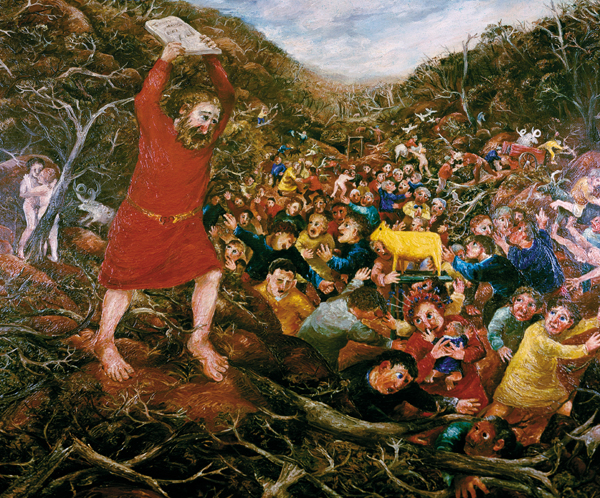
Idolatry is one of Israel’s most heinous sins, according to the biblical authors. The Tablets of the Law that Moses brings down from Mt. Sinai begin with the line: “I, YHWH (Yahweh), am your God who brought you out of the land of Egypt, the house of bondage. You shall have no other gods besides me.” Despite this, the prophets rail against Israel’s tendency to chase after other deities: “For your gods have become as many as your towns, O Judah, and you have set up as many altars to Shame [a derogatory reference to Baal] as there are streets in Jerusalem—altars for sacrifice to Baal” (Jeremiah 2:28, 11:13).
Many scholars agree that ancient Israel was a polytheistic society. The dominant view today is that the Israelite populace as a whole was not monotheistic (believing in the existence of only one god) or even monolatrous (worshiping one god while not necessarily denying the existence of others) until the period of the Babylonian Exile, in the sixth century B.C.E.
One tool commonly used to measure Israel’s polytheism is onomastics—the study of names. Both biblical and extrabiblical Israelite names are known to incorporate the names of gods—often YHWH (Yahweh), the name of the Israelite deity, but also the names of foreign gods. These names are called theophoric names, from the Greek for “bearing a god.” Examples include Saul’s son Eshbaal and grandson Merib-baal (1 Chronicles 8:33–34, 9:39–40), whose names incorporate the term baal. Similarly, the judge Gideon is sometimes referred to as Jerubbaal (Judges 6:32, 7:1, 8:29). Among the Canaanites, Baal, which literally means “lord,” was the title of the storm god Haddu/Hadad, but it was used so frequently that it functioned essentially as his name, as it is often used in the Bible. Its basic generic sense is still reflected in the fact that in the Bible (when it isn’t part of a personal name), it is always preceded by a definite article—“the Baal,” as in Judges 6:25–32. Names containing this term, scholars suggest, are evidence of Baal worship among early Israelites.
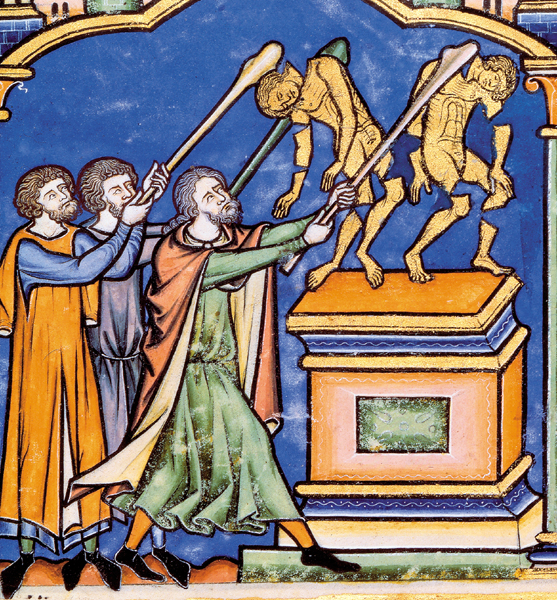
But the evidence of onomastics, as we shall see, is not quite so clear. First, there are problems in assuming that every use of a theophoric name necessarily connotes worship of a particular god. Second, and even more significant, the appearance of non-Yahwistic theophoric names in the Bible is remarkably rare. The names that Israelites gave their children do not support the case for widespread polytheism.
Both sides of the debate acknowledge the great significance attributed to names in the Bible (as in ancient Near Eastern literature in general).1 In Genesis, God names the things he creates. Adam names the animals. Both God and humans bestow or change the names of characters in the narratives such as Abram (who is renamed Abraham), Sarai (Sarah) and Jacob (Israel).
Biblical names have meaning, and the Bible often explains their significance to us. The first woman is called Woman (’ishah) because, it is said, she is taken from the body of the man (’ish) and then Eve (
Many of the Bible’s explanations of names are not real etymologies but simply play on the sound of names. The etymology of Babel is uncertain. Babylonian scribes understood it as “God’s Gate” (
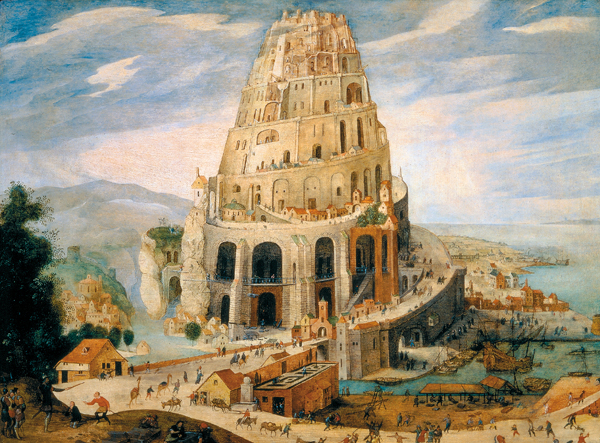
Such explanations are so clever that they could easily lead us to overlook the fact that the Bible is also perfectly capable of giving literal, etymologically correct explanations of names. For example, the angel’s instruction to Hagar to call her son Ishmael (yishma‘’el) “because the Lord has paid heed to your suffering” (Genesis 16:11) reflects the name’s literal meaning: “God (’el) hears” (yishma‘ ’el), much as Leah’s choice of the name of her second son Simeon (shim‘on, also from shama‘, “hear”) is because “the Lord heard” that she was suffering (Genesis 29:33).
Ancient Hebrew personal names (and those in related ancient languages) fall roughly into two categories, secular and theophoric.
Secular names usually consist of a single noun, such as Rachel (“ewe”), Caleb (“dog”), Deborah (“bee”), and Jonah (“dove”). Other secular names are adjectives describing the child, such as Zuar (“small,” in Numbers 1:8), Sheharhor (“black,” on a Hebrew seal2) and Ne’ehebet (“beloved,” on a seal3); a few refer to the circumstances of the child’s birth, such as Bechorat (“firstborn,” Saul’s ancestor in 1 Samuel 9:1). There are also compound phrases such as Hepzibah (“I take delight in her,” in 2 Kings 21:1) and Ahab (
Theophoric names, which fall into the second category, are more revealing religiously in that they are statements about the deity or about the worshiper’s relationship to the deity. They consist of the name, title or epithet of the deity and a word referring to an act or quality of the deity or of the person who bears the name. The names Jonathan (Yo-natan, “YHWH gave [this child]”),a Joshua (Yeho-shua‘, “YHWH is a noble”), Elijah (’eli-yahu, “YHWH is my God”), Neriah (Neri-yah[u], “YHWH is my light”), Zurishaddai (Tzuri-shadday, “My Rock is Shaddai”), Uzziah (‘Uzzi-yah[u], “YHWH is my strength”) and Abinoam (“My [divine] Father is pleasant”) are all statements about the deity.b Obadiah (‘Ebed-yah[u], “servant of YHWH”) and Mattaniah (Mattan-yah[u], “gift of YHWH”) describe the name-bearer.
Among the most common elements in Israelite names are verbs such as
Hebrew and the other Northwest Semitic languages spoken by Israel’s closest neighbors were very similar to each other, and the personal names used in these languages were also very similar. For example, the name Menahem meaning “console,” “consoler,” referring either to God or the child, appears in Hebrew, Ugaritic, Phoenician and Ammonite.4 The similar names suggest a similarity in religious feelings shared by these neighboring societies. The major difference between names in Israel and its neighbors is the deity mentioned in the theophoric names. The onomastica of other societies use the names of many deities. The overwhelming majority of theophoric names in Israel mention YHWH.
According to one count, of some 521 biblical individuals bearing theophoric names from the patriarchal period through the fall of Jerusalem in 586 B.C.E., 475 (91 percent) bear Yahwistic names (that is, they contain the name YHWH; these first appear in significant numbers in the period of the monarchy). Only 46 (9 percent) bear names that clearly, or at least plausibly, contain the names of other gods.5 The latter group include such names as Pashhur, which contains the name of the Egyptian god Horus (Hur) (Jeremiah 20:1 etc.);6 ‘Azmavet, meaning “Mawet [the Canaanite god or spirit of death] is strong” (2 Samuel 23:31 etc.); Reshep (a Canaanite god) (1 Chronicles 7:25); and (assuming he was an Israelite), Shamgar ben (son of) Anath (Judges 3:31), whose given name apparently invokes the Hurrian sun-god Shimike, while his patronym (father’s name) invokes the Canaanite goddess Anath.
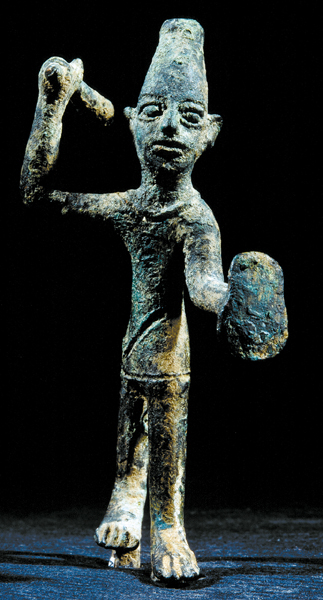
Seven biblical Israelites (including Eshbaal, Merib-baal and Jerubbaal) bear names that clearly contain the element Baal.7 But these references are not necessarily intended to evoke the Canaanite deity of that name. As noted above, Baal is a generic term that literally means “lord.” Although it regularly refers to the Canaanite deity, it was sometimes used as a title for YHWH,c as the prophet Hosea 2:18 seems to imply: “And in that day—declares the Lord—you will call [Me] ‘Ishi’ (‘my husband’), and you will no longer call Me ‘my Baal.’” It seems likely that Hosea expected the title to be abandoned because of its association with the Canaanite deity.
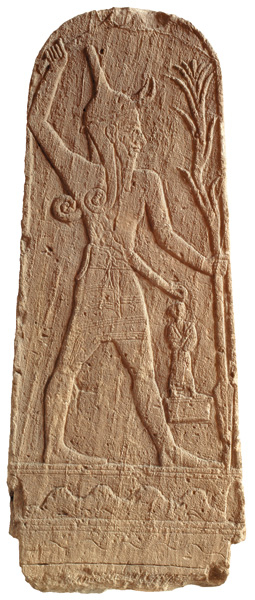
Notably, other than Baal, the deities mentioned in these names are not the deities that the Bible says the Israelites worshiped. In the Bible, the people are accused of worshiping the deities Bethel (Jeremiah 48:13);8 Milkom, god of the Ammonites (1 Kings 11:5, 33; 2 Kings 23:13); Kemosh, god of Moab (1 Kings 11:7; 2 Kings 23:13); Tammuz (Ezekiel 8:14); Moloch (Leviticus 18:21, 20:2–5; 2 Kings 23:10; Jeremiah 32:35);9 and especially Asherah or Ashtoreth (Judges 2:13, 3:7, 10:6; 1 Samuel 12:10; 1 Kings 11:5, 33; 18:19; 2 Kings 23:4, 13).10 Not one of these deities’ names appears as part of an Israelite personal name in the Bible.
Further, although the books of Kings, Ezekiel and Amos say that the Israelites worshiped the sun, moon and stars (2 Kings 17:16, 21:3, 23:4–5, 11; Ezekiel 8:16; Amos 5:26), virtually no astral deities are included in Israelite names.11
The statistical picture is complicated, however, by evidence that some biblical names mentioning foreign gods were tampered with by ancient editors. For example, the men known as Eshbaal, Merib-baal, and Jerubbaal in the Book of Chronicles, are called Ish-Bosheth, Mephibosheth, and Jerubbesheth in the received Hebrew text (the Masoretic Text) of the Book of Samuel (2 Samuel 2:8, 4:4, 5:16, 11:21). It’s unlikely that Ish-Bosheth, Mephibosheth, and Jerubbesheth are the original names, since bosheth/besheth means “shame,” and parents would hardly have used it in naming their children. Thus, the readings in Samuel were probably introduced by scribes who deliberately eliminated the element “Baal” because of its association with the Canaanite god. If scribes distorted the names in Samuel, then perhaps they did the same in other parts of the Bible. There may have originally been more biblical names mentioning foreign gods that have now been expurgated. If so, this could be further evidence of Israelite polytheism that we have lost.
One way to check whether this occurred is to study the Israelite names preserved not in the Bible but in inscriptions from the biblical period, since these have not been tampered with by later scribes. About twenty years ago, I collected all the Israelite personal names from the biblical period known from inscriptions up to that time. I expected to find numerous examples of pagan personal names—the kinds of names I suspected had been expurgated from the Bible by scribal revisions of the type just described. The results surprised me. Of the 1,200-plus individual names known from inscriptions, 671 contained a theophoric element. Seventy-eight of these had the equivocal theophoric elements ’el, “God/god,” or ’eli, “my god”—generic terms that probably referred to YHWH but might have referred to the Canaanite God El. Of the remaining 593 theophoric names, 557 were Yahwistic. Only 36 seemed clearly or very plausibly to refer to deities other than YHWH.12 Thus, of the 593 inscriptional names with clearly identifiable deities, 94 percent were Yahwistic and only 6 percent mentioned other deities.13
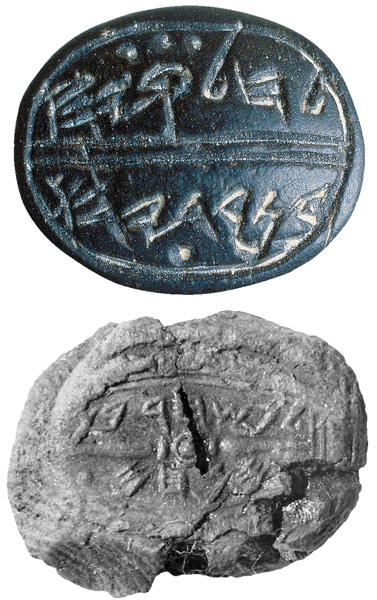
The inscriptional statistics are almost the same as in the case of biblical theophoric names where Yahwistic names predominate by 91 percent to 9 percent. The similarity of these ratios suggests that editorial censorship in the Masoretic Text did not significantly distort the actual picture.
As is the case with the names mentioned in the Bible, the inscriptional names do not include any of the foreign deities (except for Baal) that the Bible says the Israelites worshiped.14 Instead, the inscriptions mention the Edomite deity Qaus; the Canaanite diety or demon Mawet (the name means “Death”); what may be another Canaanite deity named Man or Min; Sh-l-m, which might refer to a deity mentioned in some Ugaritic texts but could also be an epithet of YHWH, meaning “(Divine) Ally” (the Bible mentions an altar named YHWH-Shalom [Judges 6:24] and the name Shelumi’el, “my shalom is God/a god”); the Egyptian deities Horus and Isis; the west Semitic spirits of good fortune Gad and Asher—though Gad is sometimes used as an epithet of YHWH (as in the name Gadiyahu, “YHWH is my spirit of good fortune”);15 the Egyptian protective deity Bes, although Bes, as well as Mawet, Gad and Asher could be spirits (demons or angels) rather than deities; the Canaanite sea-god Yam; the sun-god Shamash; and possibly a deity called “Mistress” (’Adutta’), although “mistress” may not be a theophoric element but an expression of the parents’ hopes for their daughter (“may she be a mistress”) or a slave name (short for something like “may my mistress live”).16
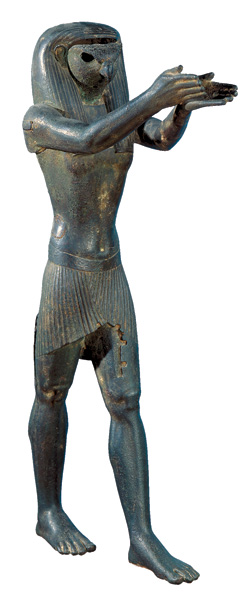
Even if all of these names do refer to other deities, there are still remarkably few of them. Elsewhere in the ancient Near East, even within a single family one often finds several deities invoked in personal names. A study of 90 families from the Babylonian city of Sippar with three or more children found that “only in thirteen instances does one god ... appear in the names of all the offspring. And even in these cases [a different god usually] appears in the father’s theophoric name.”17
Furthermore, the same study found that on seals that designate their owner as the “servant” of a particular god, “neither the name of the owner nor of his father is identical with the god of the servant phrase.”
Royal names are similarly diverse. The Neo-Assyrian king Sennacherib (
In short, in the polytheistic societies of the ancient Near East, a variety of deities are commonly invoked in personal names. What, then, are we to make of the Israelite statistics? They clearly show us how rarely—less than 10 percent of the time—Israelites chose to invoke other deities, even Baal, when naming their children. But this does not necessarily mean that even that many Israelites worshiped other gods. The use of names mentioning other gods doesn’t necessarily imply the worship of those gods. For example, the names mentioning Horus, Isis and Shamash are all in foreign languages, not Hebrew, and the Hebrew-speaking parents who bestowed them may not have recognized their meaning, just as Jews and Christians today who name their children Isidora or Martin probably do not realize that these names are derived from Isis and Mars. Moreover, certain pagan names probably remained in use simply out of inertia. No one thought to reject them. Onomastic habits change slowly, and the process is not necessarily expedited by religious revolutions, even zealous ones. In later times Christians did not begin to abandon pagan theophoric names such as Isidore, Dionysius and Aphrodisius earnestly until late in the fourth century. Before that, as the church historial Adolf Harnack succinctly put it, “Here was the primitive church exterminating every vestige of polytheism in her midst, tabooing pagan mythology as devilish ... and yet freely employing the pagan names which had hitherto been in vogue!” Wrote Harnack: “‘The martyrs perished because they declined to sacrifice to the gods whose names they bore’!”19 It may be assumed that a certain percentage of pagan theophoric names survived in Israel, too, simply out of inertia, without their users acknowledging the deities they mention.
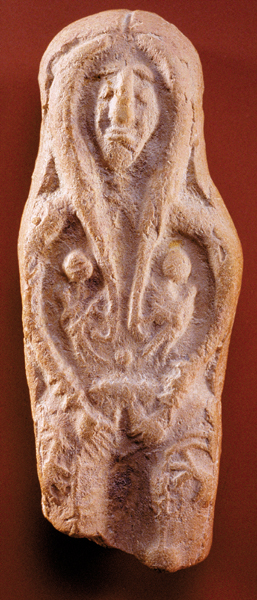
Furthermore, some of the individuals bearing these names may not have been Israelites. The extrabiblical inscriptions bearing the name of the God Qaus come from sites in the Negev, where Edomites frequently migrated and which Edom sometimes controlled, so it is possible that the bearers of Qaus-names are Edomites. Further, all but two of the inscriptions containing Baal names come from a single period at a single site, the northern capital of Samaria in the early or middle eighth century B.C.E. The names probably belonged to people connected with the government, and thus could represent foreigners, perhaps Phoenicians, in the service of the northern monarchy, comparable to Doeg the Edomite, Uriah the Hittite, and other foreigners serving Saul and David (1 Samuel 21:8; 2 Samuel 11:3, 15:19; 1 Chronicles 2:17).
But again, the remarkable thing is that even if these names do all belong to Israelites and they do refer to other deities and their meanings were known to those who bestowed them, their number is still so low.
On the other hand, the high percentage of Yahwistic names does not necessarily point to an equal percentage of monotheists or monolatrists. First, the absence of a deity from the onomasticon from a particular society does not in and of itself prove that that deity was not worshiped in that society.20 Based on ritual texts from Ugarit, we know that the goddesses Athtart (Ashtoret, Astarte), Athirat (Asherah) and Anath were all worshiped with sacrifices there,21 but they appear infrequently in personal names.22 The Punic west of the mid- to late first millennium B.C.E. produced thousands of stelae dedicated to the goddess Tannit, but personal names invoking her were relatively few.23 Even in Israel, as noted above, names containing YHWH do not appear in significant numbers until the monarchic period.
Furthermore, even polytheists could give some or all of their children Yahwistic names if Yahweh was one of the gods they worshipped. King Ahab, the sponsor of northern Israelite Baal-worship in the ninth century, had sons named Ahaziah and J(eh)oram (1 Kings 22:40; 2 Kings 3:1). Athaliah, who may have been King Ahab’s daughter, also had a Yahwistic name (1 Kings 8:18, 26).
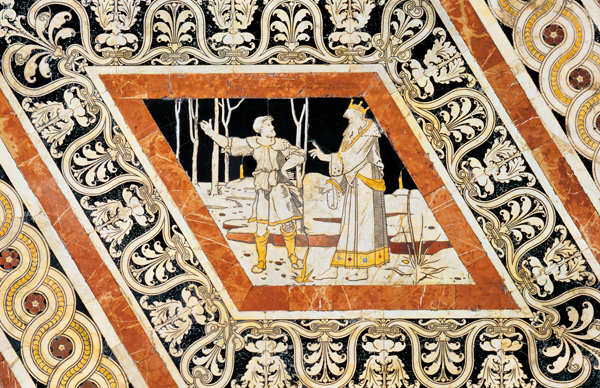
All of this shows that personal names reflect only one facet of the religious life of a particular society. Although they constitute an important piece of evidence, they do not of themselves solve the question of how many Israelites worshiped other gods in addition to YHWH. They must be combined with evidence from other types of inscriptions: Hebrew letters that invoke divine blessings on the recipient, votive inscriptions and prayers for blessing, oath formulas, religious graffiti, references to Israelite temples, temple vessels and cultic personnel, and Hebrew amulets. This evidence, which I have surveyed elsewhere, is mostly though not exclusively Yahwistic, presenting a picture essentially similar to that presented by the personal names.24 In my judgment, the extensive biblical indictments of the Israelites for idolatry, though doubtless based in fact, are probably rhetorical exaggerations by the prophets for polemical purposes and by historians to explain Israel’s military reverses and eventual Exile.
At first glance, it would seem that the Babylonian Exile had little impact on the Israelite onomasticon. The vast majority (96 percent) of Exilic and post-Exilic Israelites in the Bible25 who have theophoric names have Yahwistic ones.26 This is about the same percentage (91 percent) as in pre-Exilic Israel. But there is a significant difference: For the first time in centuries or perhaps ever (depending on what the baal in Saul’s descendants’ names refers to), Israel’s leaders have names that refer to foreign gods.
The leader of the first group of Jews who returned to Jerusalem after 538 B.C.E., when the Persian king Cyrus granted them permission, was Sheshbazzar, the prince of Judah (Ezra 1:8, 5:14 etc.). His Babylonian name seems to be a form of Sin-ab-utzur, “O Sin (the Babylonian moon god), guard the father.”27 A later group of exiles was led back to Jerusalem by another royal heir, Zerubbabel ben (son of) Shealtiel, who was appointed governor of Judah by the Persian king Darius in 522–521 B.C.E., while the Temple was being rebuilt (Haggai 1:1 etc.). The name Zerubbabel, though not theophoric, is equivalent to the Akkadian Zer-babili, “offspring of Babylon.” Zerubbabel was accompanied by men named Mordecai (from the name of the god Marduk), Bilshan (Akkadian Belshunu, “their lord”), and Bigvai, derived from Persian baga, “god” (Ezra 2:2; Nehemiah 7:7). The Book of Esther, of course, also mentions the better-known Mordecai, the cousin and foster-father of Queen Esther (Esther 2:5), and Esther herself, whose name seems to have been derived either from the name of the goddess Ishtar or from Persian stâra, “star.”28
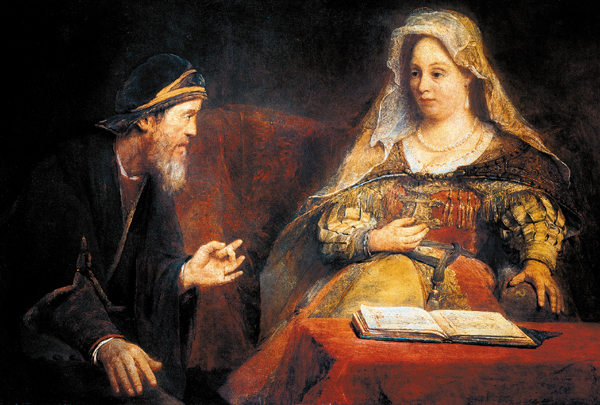
That Jews in Exile began to adopt Babylonian names, theophoric as well as nontheophoric, is also shown by the names of Jews mentioned in Akkadian business documents of the Murashu family in the Babylonian city of Nippur. More than 800 documents from the archives of this firm have been found, from the years 455 to 403 B.C.E. These documents indicate that Jews lived scattered in various villages around the city, farming, fishing and working in minor government posts. About 70 of the tablets contain names of people who, according to the late Elias Bickerman, are identifiably Jewish—that is, either they or their relatives (usually their fathers or sons) have Yahwistic or otherwise clearly Jewish names.29
The fathers in these documents were born sometime around 510 to 500 B.C.E. and their sons after 480 B.C.E., according to Bickerman. In his study of those cases where both the fathers’ and sons’ names were known, Bickerman found that fifteen of the fathers bore clearly non-Jewish, mostly Babylonian, theophoric names; thirteen bore Yahwistic names. But the remarkable thing is that the Yahwistic names doubled in popularity from the generation of the fathers to that of the sons, while the Babylonian theophoric names virtually disappeared: Twenty-seven sons had Yahwistic names and one at most had a Babylonian theophoric one.
Apparently, at some point in the century following the Exile, Jews living in Babylonia adopted Babylonian names, just as they adopted the Aramaic language and script (the latter, though much evolved, still used in Israel today) and the Babylonian month names then in use in Babylonia (and also still in use today). But around the year 480, approximately 60 years after the Jews began to return to Jerusalem and 35 years after the Temple was rebuilt (in 515 B.C.E.), Jewish parents in Nippur began to shun pagan names for their children. We are not sure why. Perhaps the return of some exiles to Jerusalem and their rebuilding of the Temple stimulated a renewal of Yahwistic loyalty as reflected in these names. Bickerman concluded that in fact “this onomastic shift explains the success of Ezra and Nehemiah ... Were it not for the ‘YHWH-alone’ groups in Nippur and elsewhere in Babylonia and the Persian Diaspora, who cajoled and convinced the Persian court, Ezra in 458 and Nehemiah in 445 would not have been sent to re-establish the [Israelite religion] in Jerusalem.”30 The return to Hebrew and Yahwistic names indicates, in other words, a reassertion of Jewish ethnic and religious identity.31
A midrashd from the Talmudic period (70-600 C.E.) claims that God redeemed the Israelites from bondage in Egypt because they had not abandoned Hebrew names or the Hebrew language, they were not guilty of unchastity, and they did not inform on one another.32 The midrash explains that when the Israelites went down to Egypt they had such names as Reuben, Simeon, Judah, Joseph, and Benjamin (see Genesis 46 and Exodus 1), and they used the same names when they left Egypt (as evidenced by the tribal names in Numbers 1); as the midrash explains, Reuben didn’t change his name to Rufus, Judah to Lulianus, Joseph to Justus, Benjamin to Alexander, and the like. Alexander, Lulianus, Justus, etc., are Greco-Roman names, and the midrash’s anachronistic assumption that Israelites might have adopted these names in Ramesside Egypt can only bring a smile to our lips. Clearly, the midrash is addressing the phenomenon of Jews adopting such names during the Roman period, when the midrash was composed, not in the time of the Exodus. Nevertheless, the midrash correctly perceives that personal names, like language and good morals, are an expression of values, loyalty and identity. The ancient Israelite onomasticon alone is not enough to tell us definitively whether exclusive devotion to a single God was one of those cherished values—although it strongly suggests that it was. And it certainly tells us that we can no longer use names as evidence of rampant polytheism in ancient Israel.

